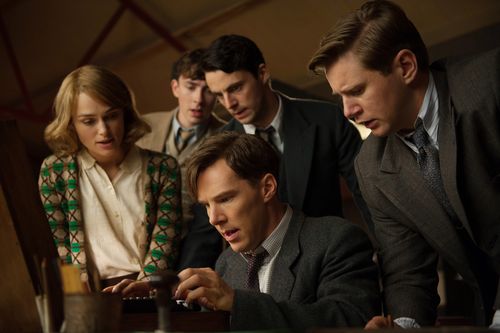
Jack English/The Weinstein Company
MOVIE REVIEW
The Imitation Game (2014)
There is something disconcertingly unsatisfying in the fact that the complex life of master mathematician, cryptanalyst and key figure in the outcome of World War II, Alan Turing (played by a magnificent Benedict Cumberbatch), is relayed here in such formulaic fashion. Turing was an enigmatic man: fiercely intelligent but emotionally distant, impersonal and difficult — yet his very genius relied on him being just so. While Morten Tyldum does attempt to unravel Turing’s tale and character by touching on his formative years at school and his ultimately tragic postwar fate, the focus here is on Turing’s work at Bletchley Park during World War II and his pioneering work on cracking the Enigma code.
Mr. Tyldum might have been best served sticking to that aspect of Turing’s story alone, as the sporadic flashbacks to his school days add little texture, while the postwar scenes are a diversion that only serves to highlight the eventual injustice afforded to a war hero on the basis of his homosexuality. Of course, Turing’s sexuality was a key aspect of his character, yet it is glossed over to such an extent that it sits rather uncomfortably.
Evidently Mr. Tyldum feels rather more comfortable in dramatic thriller territory, his exquisite previous work “Headhunters” is evidence enough of that. Bletchley Park and the race against time to crack the Nazi’s Engima code provide that context and it is here that “The Imitiation Game” really soars.
Turing arrives at Bletchley determined to take on his greatest challenge, yet another game that needs to be overcome and via a terrible job interview with Commander Denniston (a gruff Charles Dance), during which Turing reveals his brilliance and dysfunctional personality. His obtuse demeanor ensures that he soon finds himself up against more than just the Enigma machine, ostracized as he is by his fellow code breakers and command. Yet in the midst of the Blitz and an enemy winning in the Atlantic, Turing knows that the code is the key to winning the war. It’s only when he unconventionally assumes control of the operation — much to the chagrin of erstwhile lead Hugh Alexander (a suave Matthew Goode) — that Turing is allowed the means to do so.
Enter new recruit Joan Clarke (a steely, sparkling Keira Knightley), a perfect foil for Turing: a woman in a man’s world and an effective outsider, the very reason he relates to her and encourages her to realize her potential. They are effectively kindred spirits; and Mr. Cumberbatch and Ms. Knightley artfully lend their unconventional relationship credibility and affability.
As Turing et al get closer to the prize, Mr. Tyldum ramps up the dramatic tension as every breakthrough has to contend with a setback emphasizing what is really at stake here. The narrative soon develops into a multilayered series of deception — a major theme of the work — as the code breakers and their command disguise their true feelings, behaviors and intentions, essential if the war is to be won.
Given its fascinating basis, it makes for engaging viewing, elevated above the ordinary by some compelling central performances. While credit must go to scribe Graham Moore, adapting Andrew Hodges book “Alan Turing: The Enigma,” for fashioning a wry character piece, there are issues with the three-strand narrative. It’s a clunky device which detracts somewhat from the central strand of Turing’s absorbing story.
Yet “The Imitation Game” belongs to Mr. Cumberbatch, whose Turing is replete with foibles and emotional inaccessibility, almost robotic in nature, but definitely and defiantly human. It’s a skilfully crafted and nuanced performance, and is perhaps his finest work to date. Ms. Knightley, too, delivers her best turn in years, lending Clarke a determined and rebellious air tinged with intelligence. Performances aside, there is nothing particularly groundbreaking about “The Imitation Game,” but when your subject is someone as important and captivating as Turing, a celebratory tribute to his lasting legacy is enough.
THE IMITATION GAME
Opens on Nov. 14 in Britain and on Nov. 28 in the United States
Directed by Morten Tyldum; written by Graham Moore, based on the book by Andrew Hodges; director of photography, Oscar Faura; edited by William Goldenberg; music by Alexandre Desplat; production design by Maria Djurkovic; costumes by Sammy Sheldon Differ; produced by Teddy Schwarzman, Ido Ostrowsky and Nora Grossman; released by Studiocanal (Britain) and The Weinstein Company (United States). Running time: 1 hour 54 minutes. This film is rated 12A by B.B.F.C. and PG-13 by M.P.A.A.
WITH: Benedict Cumberbatch (Alan Turing), Keira Knightley (Joan Clarke), Matthew Goode (Hugh Alexander), Mark Strong (Stewart Menzies), Rory Kinnear (Detective Robert Nock), Charles Dance (Commander Denniston), Allen Leech (John Cairncross), Matthew Beard (Peter Hilton) and Alex Lawther (Young Alan).
Comments